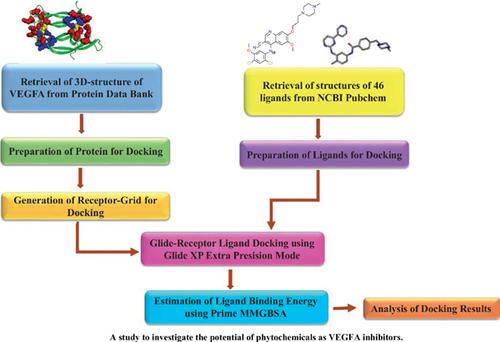Current Proteomics ( IF 0.5 ) Pub Date : 2021-07-31 , DOI: 10.2174/1570164617999200929125324 Samyuktha Lakkireddy 1 , Archana Jayaraman 1 , Sangeetha Aula 1 , Atya Kapley 1 , Vijay Kumar Kutala 2 , Kaiser Jamil 1

|
Background: Dysregulated angiogenesis resulting in neovascularization is a critical event in the expansion and progression of Chronic Myeloid Leukemia (CML), hematopoietic cancer. Vascular Endothelial Growth Factor- A (VEGFA), an important angiogenesis mediator, has been a target for treating cancer. Although several anti-VEGFA drugs are available, they are associated with adverse side effects, promoting the need to identify better drugs that may be less toxic.
Objective: Our aim was to investigate whether Tyrosine Kinase Inhibitors (TKIs) could be repurposed for use as VEGFA inhibitors via in silico docking software. We also investigated the potential of phytochemicals as VEGFA inhibitors.
Methods: We performed molecular docking using Schrödinger Maestro software suite 2014-3 to determine the most potent phytochemical and TKI VEGFA antagonists.
Results: Among the TKIs investigated, Bosutinib had the best binding affinity and may be the most potent TKI against VEGFA. The order of binding affinities for the top ten docked ligands was: Ginsenoside Rg3> Bosutinib> Vitamin D> Paclitaxel> Dasatinib> Saponins> Ponatinib> Squalamine> Imatinib> Nilotinib. We found that Ginsenoside Rg3 had the highest binding affinity (MMGBSA score= -99.4 kcal/mol, glide Gscore = -9.16 kcal/mol) to VEGFA.
Conclusion: Our study has shown for the first time the binding poses of these TKIs and phytochemicals to VEGFA, using computational methods. We propose that the use of the top scoring ligands, in isolation or a combination of phytochemicals plus TKI, could serve as potent angiogenesis inhibitors via their binding to and inhibiting VEGFA expression to prevent CML progression. We have also profiled the ligand binding residues, which may be explored in designing pharmacophores.
中文翻译:

血管内皮生长因子-A (VEGFA) 的硅胶对接研究:对慢性粒细胞白血病 (CML) 治疗的可能影响
背景:导致新血管形成的血管生成失调是慢性粒细胞白血病 (CML)、造血癌的扩展和进展的关键事件。血管内皮生长因子-A (VEGFA) 是一种重要的血管生成介质,已成为治疗癌症的目标。尽管有几种抗 VEGFA 药物可用,但它们与不良副作用有关,因此需要确定可能毒性较小的更好药物。
目的:我们的目的是研究酪氨酸激酶抑制剂 (TKI) 是否可以通过计算机对接软件重新用作 VEGFA 抑制剂。我们还研究了植物化学物质作为 VEGFA 抑制剂的潜力。
方法:我们使用 Schrödinger Maestro 软件套件 2014-3 进行分子对接,以确定最有效的植物化学物质和 TKI VEGFA 拮抗剂。
结果:在所研究的 TKI 中,Bosutinib 具有最佳的结合亲和力,并且可能是针对 VEGFA 最有效的 TKI。前十位对接配体的结合亲和力顺序为:人参皂苷Rg3>博舒替尼>维生素D>紫杉醇>达沙替尼>皂苷>波那替尼>角鲨胺>伊马替尼>尼罗替尼。我们发现人参皂苷 Rg3 对 VEGFA 具有最高的结合亲和力(MMGBSA 评分 = -99.4 kcal/mol,glide Gscore = -9.16 kcal/mol)。
结论:我们的研究首次使用计算方法显示了这些 TKI 和植物化学物质与 VEGFA 的结合姿势。我们建议使用评分最高的配体,单独使用或与植物化学物质和 TKI 结合使用,可以通过它们与 VEGFA 的结合并抑制 VEGFA 表达,作为有效的血管生成抑制剂,以防止 CML 进展。我们还分析了配体结合残基,可以在设计药效团时对其进行探索。









































 京公网安备 11010802027423号
京公网安备 11010802027423号